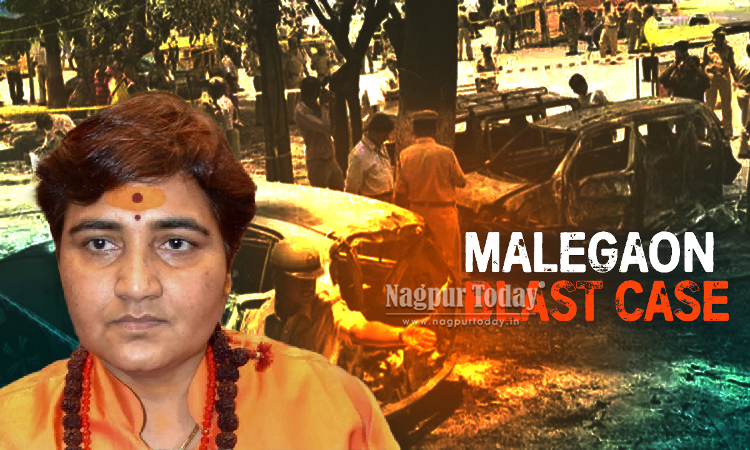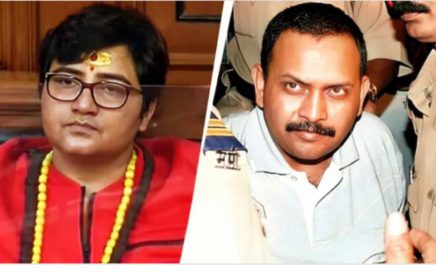 Mumbai/Nagpur: Seventeen years after the deadly Malegaon bomb blast shook Maharashtra, a Special National Investigation Agency (NIA) court on Thursday acquitted all seven accused, including BJP MP Pragya Singh Thakur and Lt Col Prasad Purohit, citing lack of concrete evidence. The verdict concludes one of India’s most politically and communally sensitive terror cases.
Mumbai/Nagpur: Seventeen years after the deadly Malegaon bomb blast shook Maharashtra, a Special National Investigation Agency (NIA) court on Thursday acquitted all seven accused, including BJP MP Pragya Singh Thakur and Lt Col Prasad Purohit, citing lack of concrete evidence. The verdict concludes one of India’s most politically and communally sensitive terror cases.
What Happened in Malegaon in 2008?
On September 29, 2008, a low-intensity blast occurred near Bhikku Chowk in Malegaon, a Muslim-majority town in Nashik district. The explosion, triggered via a bomb strapped to a Bajaj motorcycle, killed 6 people and injured over 100 others. It took place shortly after evening prayers during the holy month of Ramzan, sparking panic and communal tension.
Initial Investigations and Arrests
Initially, the Maharashtra Anti-Terrorism Squad (ATS) suspected a Muslim terror outfit’s involvement. However, the investigation later took a dramatic turn when names linked to extremist groups began to surface.
In November 2008, the ATS arrested several individuals, including:
- Sadhvi Pragya Singh Thakur
- Lt. Col. Prasad Shrikant Purohit
- Major Ramesh Upadhyay
- Sameer Kulkarni
- Sudhakar Dwivedi
- Sudhakar Chaturvedi
- Ajay Rahirkar
The motorcycle allegedly used in the blast was claimed to be registered in Pragya Thakur’s name, though she denied owning or using it at the time.
The Role of the NIA
The case was transferred to the National Investigation Agency (NIA) in 2011. The NIA later diluted several key charges, particularly those under the Unlawful Activities (Prevention) Act (UAPA). Despite criticism, the case proceeded slowly with hundreds of witnesses and frequent delays.
The Long Road to Verdict
Over 17 years, the case saw:
- Examination of 323 witnesses
- 34 witnesses turning hostile
- Thousands of pages of forensic and call data evidence
- Multiple applications for discharge and bail
In October 2018, the Special NIA Court framed formal charges, setting the stage for the trial.
Today’s Verdict: All Accused Acquitted
On July 31, 2025, the Special NIA Court in Mumbai acquitted all seven accused. The court ruled:
“The prosecution failed to prove beyond reasonable doubt that the accused conspired or executed the blast. There is no conclusive evidence linking them to the crime.”
Key findings from the court:
- No credible proof that Pragya Thakur owned the motorcycle allegedly used.
- The engine and chassis numbers were tampered with and could not be conclusively traced.
- Defective sanction orders under UAPA rendered key charges invalid.
- Medical records of victims were allegedly manipulated.
- Injured count corrected from 101 to 95.
The court emphasized that “suspicion, however strong, cannot replace proof.”
Compensation Ordered
- ₹2 lakh each to the families of the six deceased victims
- ₹50,000 each to the injured survivors
Wider Implications
This high-profile acquittal raises critical questions:
- Was the initial investigation rushed or politically motivated?
- Did investigative agencies mishandle evidence?
- What accountability exists for wrongful accusations?
The case has also had long-standing political repercussions. Sadhvi Pragya, now a sitting BJP MP from Bhopal, often cited her incarceration as a symbol of political victimization. Lt Col Purohit has also consistently claimed he was framed for his intelligence operations.
Reactions Pour In
- Supporters of the accused welcomed the verdict as justice delayed but delivered.
- Victims’ families expressed shock and disappointment, demanding accountability for investigative failures.
- Legal experts highlighted the importance of safeguarding due process in terror-related cases.
The Malegaon blast trial serves as a stark reminder of how complex and sensitive terror investigations can become when caught between political narratives, public sentiment, and flawed procedures. As the dust settles on this 17-year legal battle, the bigger questions around investigative integrity, judicial delay, and communal polarization remain unresolved.














